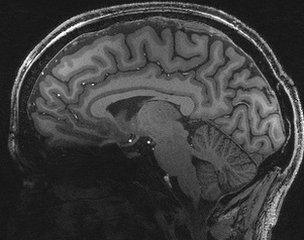A golden age of discovery in neuroscience
- Published

Developments in imaging technology, genetics, brain chemistry and computing are promising fresh insights into the workings of the mind and mental illness. Our science correspondent Tom Feilden asks what neuroscience has to say about what it means to be human.
"So this is it. This is our new toy. Not bad for eight million quid."
I'm standing in the control room at the Nuffield Department of Clinical Neurosciences's Brain Imaging Centre at the John Radcliffe Hospital in Oxford. Looking through a plate glass window with me, and gesticulating enthusiastically, is the centre's director, Professor Irene Tracey.
On the other side of the glass is one of the most powerful imaging machines anywhere in the world. Weighing in at 40 tonnes - and generating a magnetic field strength of 7 Tesla - its central component, a huge cylindrical magnet, is so big they had to take the roof off the building to get it in.
"There are only two of these ultra high field whole-body imaging systems in the UK" Professor Tracey explains.
"It's just so much more powerful than anything we've had before, and the detail you can see and the resolution of the images is just fantastic. It's taken us to the next level in terms of brain imaging."
It's at about this point that it dawns on me why Irene Tracey was quite so keen that I should come and see the scanner for myself.
The magnet was only lowered into position in July, and since then staff have been working hard to connect it all up, ready for the first patient studies - the science - to begin in the autumn.
All that remains is for a few human guinea pigs to have their brains scanned to help calibrate the machine.
"Don't worry you'll be fine," says a smiling Professor Tracey. "You like roller coasters don't you? I'm told it feels a little like your brain is going round a corner inside your head - something to do with the iron in your blood and the powerful magnetic field probably. Anyway the nausea will soon pass."
Fresh insights into human brain
But it's not just about pretty pictures. Similarly rapid advances in our understanding of the genetics and basic chemistry of the brain have raised the prospect of genuine breakthroughs across a range of previously intractable neurological disorders, and are promising fresh insights into psychological conditions like schizophrenia and autism.
"We're on the cusp of a series of major breakthroughs in our understanding of the brain" according to the head of Neuroscience and Mental Health at the Wellcome Trust, Dr John Williams. "We have a range of tools available now that will allow us to ask very profound questions of the central nervous system. Questions we were unable to ask even five years ago. Not just about how the brain functions under normative conditions, but what might happen when things go wrong."
It's a positive view that's warmly endorsed by the professor of Neuroscience at Oxford University, Colin Blakemore. "Undeniably brain research is going through an extraordinary phase of development" he says, "a golden age of discovery fuelled by a combination of all the new knowledge coming from genetics, and the dramatic improvements in imaging technology".
So much so that these days a brain scan is a fairly routine procedure. It's easy to forget that because functional Magnetic Resonance Imaging (fMRI) allows researchers to see what's happening, as its happening in the brain, it's transformed our understanding of the biochemical basis of neural activity.
Dr Belinda Lewis is using fMRI to study bipolar disorder at Cambridge University's Wolfson Brain Imaging Centre.
As her patients lie in the scanner they are shown a series of images conveying a range of human emotions - from fear and sadness, to joy and laughter.
The study shows both that the brains of those suffering from bipolar disorder are excessively stimulated by these images, and that they are less able to process, or interpret, that information accurately.
But perhaps the important aspect of the research, Dr Lennox claims, has been to demonstrate the presence of bipolar disorder in the brain.
"Fundamentally it shows that bipolar disorder, and in fact all mental illnesses, are brain disorders of a biological nature that warrant proper investigation including scanning. And that that will be of clinical utility in the near future."
It's a biological determinism that Leonard Mlodinow takes to the extreme in Subliminal: How Your Unconscious Mind Rules Your Behaviour. The invention of fMRI, he suggests, has finally elevated psychology to the status of a proper empirical science.
"Suddenly scientists could look into the brain and watch it at work. That's caused a revolution in our understanding of the unconscious mind."

Tom Feilden felt "a weird warming" sensation at the top of his head during his brain scan
What this new, evidence based, understanding of the unconscious mind tells us Leonard Mlodinow argues is that there's no hidden meaning or emotional value attached to the subliminal processing that goes on in the brain.
"You don't consciously think about it every time you take a breath, or when sound waves hit your eardrum, your brain just processes the information. In the end we're just - admittedly complex and wonderful - biochemical machines. Freud is bunk," he explains.
"What we've found is that the unconscious mind doesn't really work the way Freud, Jung and others in the 20th century thought," he said. "They didn't have access to these new technologies, and in fact they weren't really scientists because they would extrapolate and form ideas and theories based on talking to their patients. But the unconscious is not hidden from us for emotional or motivational reasons, and it can't be revealed through introspection or therapy".
Understandably perhaps psychoanalysts reject what many regard as a narrow and deterministic interpretation of development in neuroscience.
The professor of Psychology at University College London, Rachel Blass, argues that it's quite wrong to dismiss people's feelings or emotions simply because these don't show up well in an fMRI scan.
"It's an extreme materialist position. One that says mental illness is all about identifying some chemical imbalance in the brain and developing a quick-fix drug to correct it. That does nothing to help the patient address the issues or problems they might be facing and come to terms with them in their life."
Prof Geraint Rees: 'Extraordinary time' for neuroscience
Whether or not the psychological aspects of human behaviour can be adequately described in terms of biochemical activity in the brain, it seems clear that neuroscience is going to play an increasingly important role in our lives. That was certainly the conclusion reached by the Royal Society's Brain Waves project, chaired by Prof Blakemore earlier this year.
"Everything we do must be the result of all of the influences on the state of our brain at the moment we do it," he said.
"You can include family background, genetics, our social circumstances, how much money we earn, memories of particular events. All of that's in our heads, and we will get some kind of mechanistic description of that in time."
And the brain scan? In the end, the hardest part turned out to be trying to keep still and not to scratch my nose. And while it was quite a snug fit in the centre of one of the most powerful imaging machines in the country, the only sensation I felt was a weird warming at the top of my head.
Not bad for an experience that allows me to boast - like Hooke or Faraday - about putting my body on the line for science.
The Today, external programme is broadcast on BBC Radio 4 at 06:00 BST Monday to Friday and 07:00 on Saturdays.